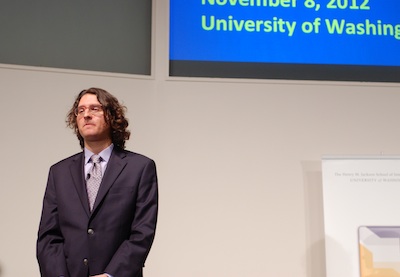By Joel Magalnick , Editor, JTNews
Everyone, as Andy Warhol put it, gets their 15 minutes of fame. But what’s more enriching, and without the glare of the paparazzi, is getting 15 minutes of knowledge. That’s the idea behind the popular TED Talks, online lectures that last 10 to 15 minutes on a subject of the speaker’s expertise where anyone with an Internet connection can learn something on just about anything.
On Nov. 8, the online speed lecture went Jewish.
“It’s great content that people are getting in their living room,” said Prof. Noam Pianko, who chairs the Stroum Jewish Studies Program at the University of Washington, and the creator of JewDub Talks.
Armed with four of the program’s popular professors and a $5,000 Small and Simple grant from the Jewish Federation of Greater Seattle to cover the cost of the film crew, Pianko and assistant program director Lauren Spokane launched JewDub Talks in a campus lecture hall with about 75 spectators attending the live program. While the audience got to see some of the more technical aspects of the taping — the mic checks and the countdown clock at the back of the room, for example — the lectures they saw are exactly what viewers from anywhere in the world can see at www.jewdub.org.
It’s a “really effective way of presenting ideas about Judaism and in a way that I think is quite digestible,” Pianko said.
The talks presented a diverse lineup: Prof. Barbara Henry compressed a thousand years of Yiddish history in to her quarter hour, and injected her own upbringing as a non-Jew in a heavily Jewish neighborhood in New Jersey. She explained how that experience brought her to the study of the vibrant and intermingled Russian and Yiddish cultures decimated in World War II. Shalom Sabar, a visiting professor from Hebrew University in Jerusalem, explained how the very Jewish tradition of breaking a glass at a wedding draws its roots from German culture.
Classics professor Sarah Culpepper Stroup, who leads archaeological digs each summer in Israel, used three historical characters — the Maccabees, Alexander the Great, and Jewish playwright Ezekiel — to challenge long-held assumptions about Jewish tradition. The historical record in the form of pot sherds and neighborhood layouts, she explained, show that Jews in antiquity didn’t remain as separate from the populations with whom they lived as people believe. Finally, Sephardic studies professor Devin Naar gave a very personal and emotional account of his family’s history in the Greek city of Salonika, which had a majority Jewish population until the Nazis invaded.
Pianko said the benefit of having experts give these talks in their field of study is the depth of information they can provide.
“We don’t often get a chance to challenge the Hanukkah narrative,” he said. “One of the unique things that academics or faculty can contribute is this scholarly perspective that tends to ask critical questions, maybe take on taboo topics.”
Spokane told the audience that preparations for the talks were a “totally, crazily radical thing to do”: The professors, who are used to lecturing in 50-minute blocks, had to outline and actually rehearse.
“Several of the speakers had to do a lot of editing to get it down,” Spokane told JTNews.
Stroup said preparations for her 15 minutes weren’t an easy task.
“It was a form that is very different from anything I’ve been used to or ever done before,” she said. But, she added, “I did enjoy it. As a professor, I like being challenged.”
As a classicist, presenting a big idea in a bite-sized chunk is the inverse of her field.
“We deal with a small idea in 300 pages,” she said.
If Stroup has any quibble with the format, however, it’s the one-sided nature.
“The one thing I did feel constrained by was when I teach I like to be able to stop and address student questions, or respond to my students,” she said. “It lacks that interaction that I find crucial in what I do.”
Response to the talks themselves has been positive, Pianko and Spokane both said.
“A lot of folks are saying, “˜When’s the next one?’” Spokane said.
Given the amount of time the program needed to prepare for the talks, plus the expense of booking film crews and compensating the professors for their extra work, a monthly program isn’t feasible.
“There are a lot of challenges to doing this sort of thing,” Pianko said.
But reaching out to both students and community members in new, innovative ways is a must, Pianko said.
“If they’re going to be spending a lot of time looking at media and learning on their iPads or their computers, then we should be there,” he said. “A public lecture is one effective way of getting information across, but today there are so many other vehicles that are eclipsing the lecture in the way that people are getting information.”
Pianko said the university’s department of digital communications has been in touch about how the JewDub Talks can be leveraged elsewhere on campus. Also, Jewish Studies programs elsewhere are looking at how the online version of this project goes, he added.
“We’ll gain national recognition because lots of Jewish Studies programs are trying to figure out creative public programming,” he said.
